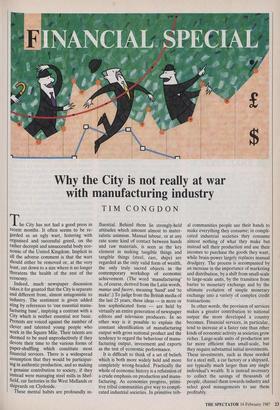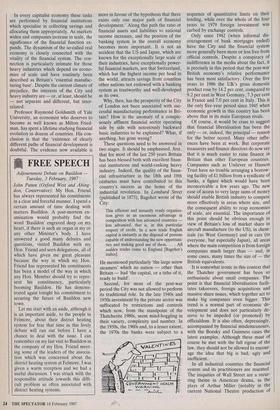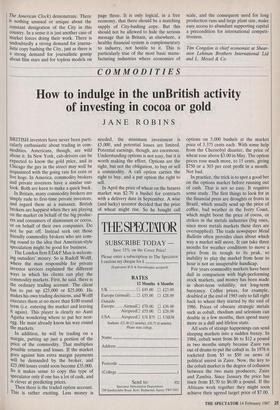Why the City is not really at war with manufacturing
industry
TIM CONGDON
The City has not had a good press in recent months. It often seems to be re- garded as an ugly wart, festering with organised and successful greed, on the rather decrepit and unsuccessful body eco- nomic of the United Kingdom. Implicit in all the adverse comment is that the wart should either be removed or, at the very least, cut down to a size where it no longer threatens the health of the rest of the economy.
Indeed, much newspaper discussion takes it for granted that the City is separate and different from, almost antagonistic to Industry. The sentiment is given added sting by references to 'our essential manu- facturing base', implying a contrast with a City which is neither essential nor basic. Protests are voiced against the number of clever and talented young people who work in the Square Mile. Their talents are deemed to be used unproductively if they devote their time to the various forms of paper-shuffling which constitute most financial services. There is a widespread assumption that they would be participat- ing in authentic production, and so making a genuine contribution to society, if they Instead were managing steel mills in Shef- field, car factories in the West Midlands or shipyards on Clydeside.
These mental habits are profoundly in- fluential. Behind them lie strongly-held attitudes which amount almost to mater- ialistic animism. Manual labour, or at any rate some kind of contact between hands and raw materials, is seen as the key element in making tangible things and tangible things (steel, cars, ships) are regarded as the only valid form of wealth, the only truly sacred objects in the contemporary workshop of economic achievement. (The word 'manufacturing' is, of course, derived from the Latin words, manus and facere, meaning 'hand' and 'to make'.) To judge from the British media of the last 25 years, these ideas — in more or less sophisticated form — are held by virtually an entire generation of newspaper editors and television producers. In no other way is it possible to explain the constant identification of manufacturing output with gross national product and the tendency to regard the behaviour of manu- facturing output, investment and exports as the test of economic performance.
It is difficult to think of a set of beliefs which is both more widely held and more completely wrong-headed. Practically the whole of economic history is a refutation of a crude emphasis on production and manu- facturing. As economies progress, primi- tive tribal communities give way to compli- cated industrial societies. In primitive trib- al communities people use their hands to make everything they consume; in compli- cated industrial societies they consume almost nothing of what they make but instead sell their production and use their incomes to purchase the goods they want, while brain-power largely replaces manual drudgery. The process is accompanied by an increase in the importance of marketing and distribution, by a shift from small-scale to large-scale units, by the transition from barter to monetary exchange and by the ultimate evolution of simple monetary exchange into a variety of complex credit transactions.
In other words, the provision of services makes a greater contribution to national output the more developed a country becomes. Financial services, in particular, tend to increase at a faster rate than other kinds of economic activity as societies grow richer. Large-scale units of production are far more efficient than small-scale, but they require substantial initial investments. These investments, such as those needed for a steel mill, a car factory or a shipyard, are typically much larger than any single individual's wealth. It is instead necessary to collect the savings of thousands of people, channel them towards industry and select good managements to use them profitably. In every capitalist economy these tasks are performed by financial institutions which specialise in collecting savings and allocating them appropriately. As markets widen and companies increase in scale, the significance of the financial function ex- pands. The dynamism of the so-called real economy is closely connected with the vitality of the financial system. The con- nection is particularly intimate for those heavy industries which depend on econo- mies of scale and have routinely been described as Britain's 'essential manufac- turing base'. Despite the current climate of prejudice, the interests of the City and heavy industry are — or, at least, should be — not separate and different, but inter- related.
Professor Raymond Goldsmith of Yale University, an economist who deserves to become as well known as Milton Fried- man, has spent a lifetime studying financial evolution in dozens of countries. His con- clusion is that the 'existence of clearly different paths of financial development is doubtful. The evidence now available is more in favour of the hypothesis that there exists only one major path of financial development.' Along this path the ratio of financial assets and liabilities to national income increases, and the position of the banking system in the overall economy becomes more important. It is not an accident that the US and Japan, which are known for the exceptionally large scale of their industries, have exceptionally power- ful financial markets, nor that Switzerland, which has the highest income per head in the world, attracts savings from countless other nations not endowed with a banking system as trustworthy and well-developed as its own.
Why, then, has the prosperity of the City of London not been associated with suc- cessful manufacturing performance in Bri- tain? How is the anomaly of a conspic- uously affluent financial sector operating side by side with notoriously backward basic industries to be explained? What, if anything, has gone wrong?
These questions need to be answered in two stages. It should be emphasised, first, that for most of the last 250 years Britain has been blessed both with excellent finan- cial institutions and world-ranking heavy industry. Indeed, the quality of the finan- cial infrastructure in the 18th and 19th centuries must have contributed to this country's success as the home of the industrial revolution. In Lombard Street (published in 1873), Bagehot wrote of the City:
This efficient and instantly ready organisa- tion gives us an enormous advantage in competition with less advanced countries less advanced, that is, in this particular respect of credit. In a new trade English capital is instantly at the disposal of persons capable of understanding the new opportuni- ties and making good use of them. . . . All sudden trades come to England [Bagehot's italics].
He mentioned particularly 'the large screw steamers' which no nation — other than Britain — had 'the capital, or a tithe of it, ready to build'.
Second, for most of the post-war period the City was not allowed to perform its traditional role. In the late 1940s and 1950s investment by the private sector was suffocated by restrictions and controls which now, from the standpoint of the Thatcherite 1980s, seem mind-boggling in their variety, complexity and number. In the 1950s, the 1960s and, to a lesser extent, the 1970s the banks were subject to a sequence of quantitative limits on their lending, while over the whole of the four years to 1979 foreign investment was curbed by exchange controls.
Only since 1982 (when informal dis- couragement of bank mortgages ended) have the City and the financial system more generally been more or less free from official controls. Despite a conspiracy of indifference in the media about the fact, it is precisely in this period that the post-war British economy's relative performance has been most satisfactory. Over the five years to 1986 the UK's gross domestic product rose by 14.2 per cent, compared to 9.2 per cent in West Germany, 7.3 per cent in France and 7.0 per cent in Italy. This is the only five-year period since 1945 when economic growth in this country has been above that in its main European rivals. Of course, it would be crass to suggest that financial liberalisation has been the only — or, indeed, the principal — reason for the better record. Many other influ- ences have been at work. But corporate treasurers and finance directors do now say that it is much easier to raise finance in Britain than other European countries. Companies such as Unilever or Hanson Trust have no trouble arranging a borrow- ing facility of E1 billion from a syndicate of banks, a figure which would have been inconceivable a few years ago. The new ease of access to very large sums of money should enable British industry to compete more effectively in areas where size, and the consequent ability to reap economies of scale, are essential. The importance of this point should be obvious enough in view of Britain's loss of market share in aircraft manufacture (to the US), in chem- icals (to West Germany) and in cars (to everyone, but especially Japan), all areas where the main competition is from foreign companies much larger than — and, in some cases, many times the size of — the British equivalents.
It is somewhat ironic in this context that the Thatcher government has been so enthusiastic about small companies. The point is that financial liberalisation facili- tates takeovers, foreign acquisitions and massive share issues, which together act to make big companies even bigger. This trend is a normal part of economic de- velopment and does not particularly de- serve to be impeded (or promoted) by officialdom. It is also often, depressingly, accompanied by financial misdemeanours, with the Boesky and Guinness cases the latest examples. Although these must of course be met with the full rigour of the law, they should not be allowed to encour- age the idea that big is bad, ugly and inefficient.
In all industrial countries the financial system and its practitioners are resented. The iniquities of Wall Street are a recur- ring theme in American drama, as the plays of Arthur Miller (notably in the current National Theatre production of The American Clock) demonstrate. There is nothing unusual or unique about the constant denigration of the City in this country. In a sense it is just another case of market forces doing their work. There is undoubtedly a strong demand for journa- listic copy bashing the City, just as there is a strong demand for journalistic gossip about film stars and for topless models on page three. It is only logical, in a free economy, that there should be a matching supply of City-bashing copy. But this should not be allowed to hide the serious message that in Britain, as elsewhere, a healthy financial system is complementary to industry, not hostile to it. This is particularly true of the most basic manu- facturing industries where economies of scale, and the consequent need for long production runs and large plant size, make easy access to abundant supporting capital a precondition for international competi- tiveness.
Tim Congdon is chief economist at Shear- ston Lehman Brothers International Ltd and L. Messel & Co.




























































 Previous page
Previous page